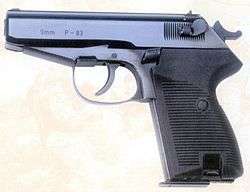FB P-83 Wanad
The P-83 Wanad (Pl. Vanadium) is a single-action and double-action Polish semi-automatic pistol, chambered for the 9×18mm Makarov cartridge and designed by Ryszard Chełmicki and Marian Gryszkiewicz of the state research institute Ośrodek Badawczo-Rozwojowy in Radom. The P-83 succeeded the P-64 as the sidearm for the Polish Army and police. The P-83 is still in limited use by both the Polish police and the Polish military but it has been mostly replaced by Glock 19 pistols in Police service and partially by the indigenous WIST 94 pistol in the Polish military.
| P-83 Wanad | |
|---|---|
 P-83 pistol | |
| Type | Semi-automatic pistol |
| Place of origin | Poland |
| Service history | |
| In service | 1983–present |
| Used by | Polish police and armed forces |
| Wars | Yugoslav Wars Iraq War |
| Production history | |
| Designer | OBR Radom |
| Designed | 1978 |
| Manufacturer | FB Radom |
| Produced | 1983-2000 |
| Variants | P-83 in (9×17mm Short), P-83M, P-83G, P-93, PT-83 |
| Specifications | |
| Mass | 730 g (26 oz) (P-83, P-83G) 650 g (23 oz) (P-83M) 750 g (26 oz) (P-93) |
| Length | 165 mm (6.5 in) (P-83, P-83G) 170 mm (6.7 in) (P-93M) 178 mm (7.0 in) (P-93) |
| Barrel length | 90 mm (3.5 in) (P-83, P-83M, P-83G) 100 mm (3.9 in) (P-93) |
| Width | 30 mm (1.2 in) (P-83, P-83G, P-93) 34 mm (1.3 in) (P-83M) |
| Height | 125 mm (4.9 in) (P-83, P-83G, P-93) 127 mm (5.0 in) (P-83M) |
| Cartridge | 9×18mm Makarov (P-83, P-83M, P-93) .380 ACP (9×17mm Short) (P-83) .32 ACP (7.65x17mm Browning SR) (P-83) 9 mm PA (P-83G) |
| Action | Straight blowback |
| Muzzle velocity | 312 m/s (1,024 ft/s) (P-83, P-83M) 284 m/s (931.8 ft/s) (P-83 in 9×17mm Short) 316 m/s (1,036.7 ft/s) (P-93) |
| Effective firing range | Sights fixed for 25 m (9×18mm Makarov) |
| Feed system | 8-round box magazine |
| Sights | Fixed, front blade and rear notch |
Design Details
The P-83 is a double-action/single-action straight-blowback operated pistol with a single stack 8-round box magazine. It is formed primarily of sheet metal stampings which have been blued.
The pistol has an external case extractor on the slide which actuates a loaded chamber indicator (which, both visually and tactilely, indicates the presence of a round in the chamber). There is a manual safety lever on the left side of the slide with the upward position being "Safe" and the lower position being "Fire" (there is a red dot on the slide which is hidden by the safety when in "Safe"). The "Safe" position decocks the hammer while the trigger remains in the single-action position, and drops the firing pin down to a position where the hammer face is milled out to prevent contact with the pin. Additionally, the firing pin has a hook designed into the rearmost portion that will engage with the rear of the slide to prevent forward movement when the safety is engaged. When the safety is disengaged, the trigger will return to full forward extension to allow a double-action first trigger pull. The P-83 also has a hammer block safety, similar to some revolvers.
The P-83 has a traditional European heel magazine release and a lanyard loop on the left side at the base of the grip. The magazine release is tensioned by the hammer spring as a simplification measure.
The grip panels are grooved black plastic that form the side and back of the grip section, and are held together by a single screw.
Civilian version
Civilian guns have different shaped sights, a rounded hammer and different markings on the slide: a Polish eagle followed by “RADOM wz. P-83 9×18 POLAND Z.M. LUCZNIK”. The name of the importing company is stamped on the left side of the frame.
_Civilian_Export_edition.jpg)
See also
- 9×18mm Makarov
- P-64 Radom (pistol)
External links
| Wikimedia Commons has media related to P-83 Wanad. |
- The Unofficial P-64 Resource
- Post #50487, Detailed takedown of P83 in "Other 9x18's" forum, The Unofficial P-64 Resource Forums
- World Guns, Modern Firearms, Handguns, P-83 pistol (Poland)
- P-83 Wanad Pistol, User's Guide: Safety and Instruction Manual for the Polish P-83 (P83) Wanad Pistol Makarov 9x18mm
- Firearms and Ammunition, P-83 Wanad